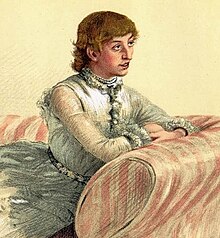Florence Dixie
| Florence Dixie | |
|---|---|

Detail from the Vanity Fair portrait of 1884
|
|
| Born |
Florence Caroline Douglas 25 May 1855 Cummertrees, Dumfriesshire, Scotland, UK |
| Died | 7 November 1905 (aged 50) Glen Stuart, Dumfriesshire, Scotland |
| Nationality | Scottish |
| Occupation | War correspondent |
| Known for | Feminist |
| Spouse(s) | Alexander Beaumont Churchill Dixie |
Lady Florence Caroline Dixie (née Douglas; 25 May 1855 – 7 November 1905), was a Scottish traveller, war correspondent, writer and feminist. Her account of travelling Across Patagonia, her children's books The Young Castaways and Aniwee, or, The Warrior Queen, and her feminist utopia Gloriana, or the Revolution of 1900 all deal with feminist themes related to girls, women, and their positions in society.
Born in Cummertrees, Dumfries, Scotland on 25 May 1855, Lady Florence Douglas was the daughter of Caroline Margaret Clayton (1821–1904), daughter of General Sir William Clayton, 5th Baronet (1786–1866), Member of Parliament for Great Marlow and Archibald Douglas (18 April 1818 – 6 August 1858) 8th Marquess of Queensberry.
She had a twin brother, Lord James Edward Sholto Douglas (d. 1891), an older sister, Lady Gertrude Douglas (1842–1893), and three older brothers: John, Viscount Drunlanrig (1844–1900), later 9th Marquess of Queensberry, Lord Francis Douglas (1847–1865), and Reverend Lord Archibald Edward Douglas (1850–1938).
Florence has been described as a tomboy who tried to match her brothers in physical activities, whether swimming, riding, or hunting. She rode astride, wore her hair short in a boyish crop, and refused to conform to fashion when being presented to Queen Victoria. She and her twin brother James were particularly close during childhood, calling each other "Darling" (Florence) and "Dearest" (James). She was also close to her older brother John, whom she resembled in temperament, both being "fearless, dynamic and opinionated".
Her childhood was marked by a number of dramatic and even tragic events. On 6 August 1858, when she was 3, Lady Florence's father died in what was reported as a shooting accident, but was widely believed to have been suicide. In 1862 his widow Caroline acted upon a long-formed conviction and converted to Catholicism. She took her youngest children, Archibald (12), Florence and James (7) to France, where she could educate them as she wished. This led the children's guardians to threaten Lady Queensberry with the loss of her children under English law. The three were too young to choose a guardian under Scottish law. They remained in France for two years. Falconer Atlee, British Consul at Nantes, offered them a place of safety when their first location was discovered, and Emperor Napoleon III eventually extended her his protection, ensuring that she could retain custody of the children. Archibald converted and took holy orders, becoming a Roman Catholic priest. Caroline's older daughter, Gertrude, also became Catholic. When her Protestant fiance would not agree to raise their children in the Catholic faith, Gertrude's engagement was broken off. She entered a convent in Hammersmith and completed her novitiate to become a Sister of the Black Veil in 1867, but later left the order.
...
Wikipedia
